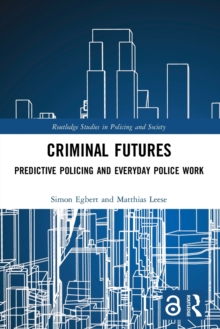Description
| Product ID: | 9780367643614 |
| Product Form: | Paperback / softback |
| Country of Manufacture: | GB |
| Series: | Routledge Studies in Policing and Society |
| Title: | Criminal Futures |
| Subtitle: | Predictive Policing and Everyday Police Work |
| Authors: | Author: Matthias Leese, Simon Egbert |
| Page Count: | 242 |
| Subjects: | Peace studies and conflict resolution, Peace studies & conflict resolution, Social and ethical issues, Sociology, Penology and punishment, Politics and government, Warfare and defence, Economics, Organizational theory and behaviour, Legal aspects of criminology, Criminal justice law, Police law and police procedures, Digital and information technologies: social and ethical aspects, Digital and information technologies: Legal aspects, Algorithms and data structures, Computer science, Social issues & processes, Sociology, Penology & punishment, Politics & government, Warfare & defence, Economics, Organizational theory & behaviour, Criminology: legal aspects, Criminal justice law, Police law & police procedures, Ethical & social aspects of IT, Legal aspects of IT, Algorithms & data structures, Computer science |
| Description: | Select Guide Rating This book explores how algorithmic prediction tools transform police work. Building on the growing literature at the intersection of policing and technology studies, this book examines the impact of predictive policing on organizational structures and the ways in which criminal futures are constructed by the police. This book explores how predictive policing transforms police work. Police departments around the world have started to use data-driven applications to produce crime forecasts and intervene into the future through targeted prevention measures. Based on three years of field research in Germany and Switzerland, this book provides a theoretically sophisticated and empirically detailed account of how the police produce and act upon criminal futures as part of their everyday work practices. The authors argue that predictive policing must not be analyzed as an isolated technological artifact, but as part of a larger sociotechnical system that is embedded in organizational structures and occupational cultures. The book highlights how, for crime prediction software to come to matter and play a role in more efficient and targeted police work, several translation processes are needed to align human and nonhuman actors across different divisions of police work. Police work is a key function for the production and maintenance of public order, but it can also discriminate, exclude, and violate civil liberties and human rights. When criminal futures come into being in the form of algorithmically produced risk estimates, this can have wide-ranging consequences. Building on empirical findings, the book presents a number of practical recommendations for the prudent use of algorithmic analysis tools in police work that will speak to the protection of civil liberties and human rights as much as they will speak to the professional needs of police organizations. An accessible and compelling read, this book will appeal to students and scholars of criminology, sociology, and cultural studies as well as to police practitioners and civil liberties advocates, in addition to all those who are interested in how to implement reasonable forms of data-driven policing. |
| Imprint Name: | Routledge |
| Publisher Name: | Taylor & Francis Ltd |
| Country of Publication: | GB |
| Publishing Date: | 2022-06-30 |


